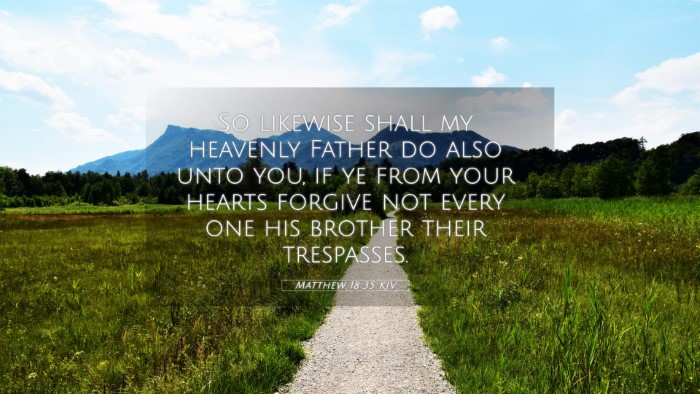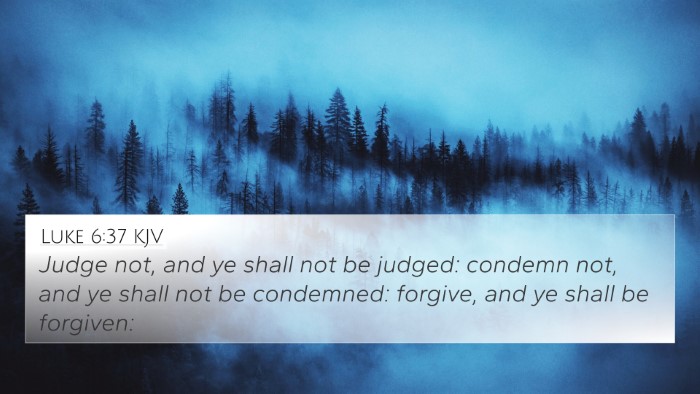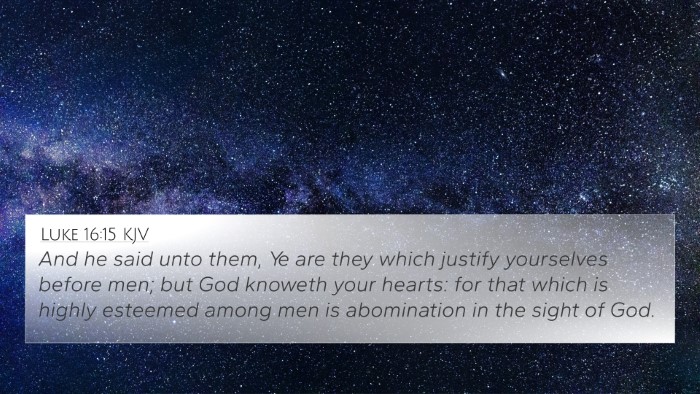Understanding Matthew 18:35
Verse: “So likewise shall my heavenly Father do also unto you, if ye from your hearts forgive not every one his brother their trespasses.” – Matthew 18:35
Summary of Meaning
This verse illustrates the principle of forgiveness within the context of God's grace and mercy. It is important to recognize that true forgiveness is key to maintaining one's relationship with God. The comparison made here between the forgiveness we show to others and the forgiveness we receive from God underscores the reciprocal nature of divine mercy.
Commentary Insights
-
Matthew Henry:
Henry emphasizes that unmercifulness is a disastrous trait among believers. He notes that this verse serves as a stern reminder that failure to genuinely forgive others can lead one to forfeit God's mercy. The heart's condition is vital in the context of our forgiveness; it must be sincere.
-
Albert Barnes:
Barnes points out that the phrase "from your hearts" indicates the need for sincere, total forgiveness rather than superficial or grudging forgiveness. He elaborates that genuine forgiveness reflects the character of God and is essential for spiritual well-being.
-
Adam Clarke:
Clarke discusses the consequences of failing to forgive. He interprets this verse as not merely moral instruction but also a warning that one's eternal standing before God can be affected by a lack of forgiveness, challenging believers to reflect God's love through acts of mercy.
Bible Verse Cross-References
- Matthew 6:14-15: “For if ye forgive men their trespasses, your heavenly Father will also forgive you: But if ye forgive not men their trespasses, neither will your Father forgive your trespasses.”
- Mark 11:25-26: “And when ye stand praying, forgive, if ye have ought against any: that your Father also which is in heaven may forgive you your trespasses.”
- Luke 6:37: “Judge not, and ye shall not be judged: condemn not, and ye shall not be condemned: forgive, and ye shall be forgiven.”
- Ephesians 4:32: “And be ye kind one to another, tenderhearted, forgiving one another, even as God for Christ's sake hath forgiven you.”
- Colossians 3:13: “Forbearing one another, and forgiving one another, if any man have a quarrel against any: even as Christ forgave you, so also do ye.”
- James 2:13: “For he shall have judgment without mercy, that hath showed no mercy; and mercy rejoiceth against judgment.”
- 1 John 1:9: “If we confess our sins, he is faithful and just to forgive us our sins, and to cleanse us from all unrighteousness.”
Connections Between Bible Verses
The verse can be linked to several important themes in the Bible, particularly the themes of forgiveness, mercy, and the conditions of maintaining one's relationship with God. Below are thematic connections and insights regarding how these verses interact:
- Mercy and Forgiveness: The concept of mercy, highlighted in Matthew 18:35, is a prevalent theme across both the Old and New Testaments. The repeated call to forgive underscores the essence of divine grace.
- Sincerity in Actions: Matthew 5:23-24 emphasizes the importance of reconciliation as a precondition for worship and acceptance by God, complementing Matthew 18:35's emphasis on a genuine heart.
- Consequences of Unforgiveness: Proverbs 21:13 speaks to the fate of those who ignore the plight of the needy, analogous to how Matthew 18:35 addresses those who neglect to forgive, hinting at spiritual repercussions.
Conclusion
Matthew 18:35 serves as a crucial reminder of the reciprocal nature of forgiveness in the life of a believer. Understanding this verse within its broader biblical context enhances one's grasp of God's expectations regarding human relationships and divine grace.
















